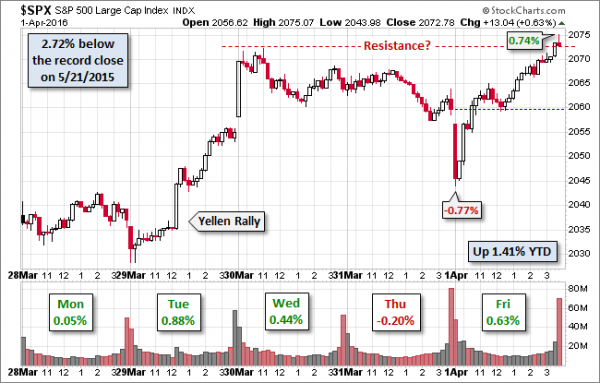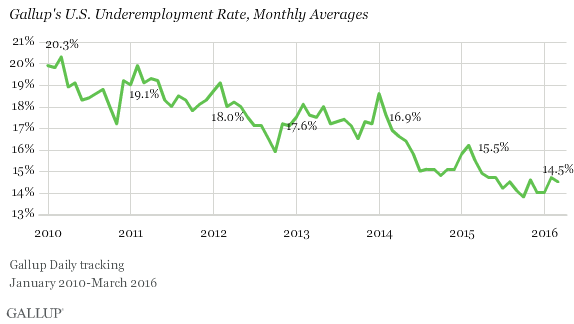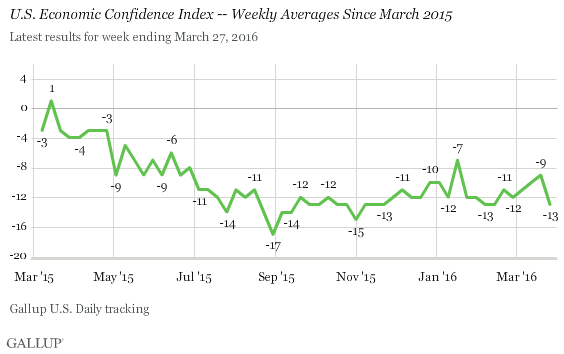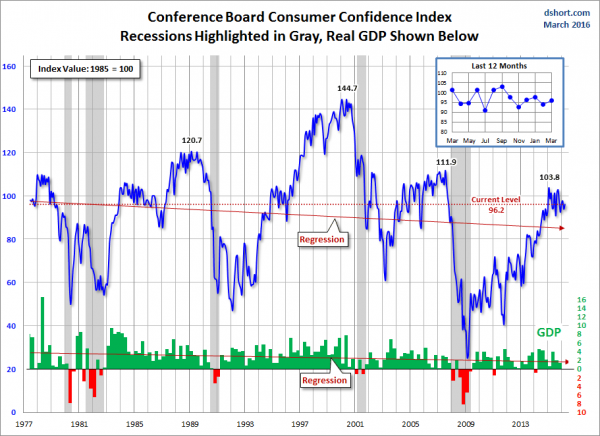The calendar continues in something of an alternating mode. Last week had plenty of important data; this week has little. Instead we get multiple speeches from Fed Presidents and Governors and the release of the last FOMC minutes. Little data plus lots of Fed news is a natural draw for the punditry. This week they will be asking:
Is the Fed too optimistic?
Prior Theme Recap
In my last WTWA I predicted a week chock-full of data with a focus on the market reaction. Would good news finally be treated as good? That was a popular topic throughout the week, from Chair Yellen’s speech to Friday’s employment report. Before the opening on Friday, pundits were observing that the solid data was sending stocks lower. By day’s end the market had reversed course, despite weakness in oil prices. The answer to last week’s question is a very tentative “yes.” Doug Short has the full story with an emphasis on April Fool’s Day in his excellent weekly chart. (With the ever-increasing effects from foreign markets, you should also add Doug’s World Markets Weekend Update to your reading list).

Doug’s update also provides multi-year context. See his World Markets Weekend Update for more excellent charts and analysis.
We would all like to know the direction of the market in advance. Good luck with that! Second best is planning what to look for and how to react. That is the purpose of considering possible themes for the week ahead. You can make your own predictions in the comments.
This Week’s Theme
The economic calendar has few important reports. Once again, the Fed participants will be out in force. The minutes from the last FOMC meeting will be released. Chair Yellen joins a panel discussion with three past Fed chairs. It is a paradise for pundits. They can spend the entire week on the Fed, their favorite topic. With the background of last week’s news the discussion might have a little more focus. In particular many will be asking:
Is the Fed too optimistic?
Background
There is a huge divergence in opinion about the economy. The data tell one story. Opinion tells another. Compare these two Gallup surveys:
Employment data show strength on every measure. Under-employment is a typical example.

Meanwhile, 29% of Gallup respondents rate current conditions as “poor” and 58% think things are getting worse.

Are these opinions too pessimistic?
MRB Partners recent update notes the unwinding of recession fears and the strength of recent data. They suggest that economic surprises will mean upside for stocks and risk for bonds.
Who will be correct?
Viewpoints
The basic themes are familiar.
Challenge Revisited
Your conclusion about how stocks will react is a function of what you believe is driving current market action. We do not get paid for knowing yesterday’s news, but it is important to understand the sources of market reaction.
Last week I suggested a challenge for the week ahead: Would commentators turn to “window dressing” as an explanation for any strength? Friday provided an even better test. In the morning, after all of the key data had been released, pundits observed that “good news was bad.” By the end of the day both the story and the explanations had changed!
The question now is whether Friday’s trading signaled a change in market tone – a willingness to take positive news at face value.
As always, I have my own opinion in the conclusion. But first, let us do our regular update of the last week’s news and data. Readers, especially those new to this series, will benefit from reading the background information.
Last Week’s Data
Each week I break down events into good and bad. Often there is an “ugly” and on rare occasion something really good. My working definition of “good” has two components:
The Good
There was good news in a big week for data.














Leave A Comment